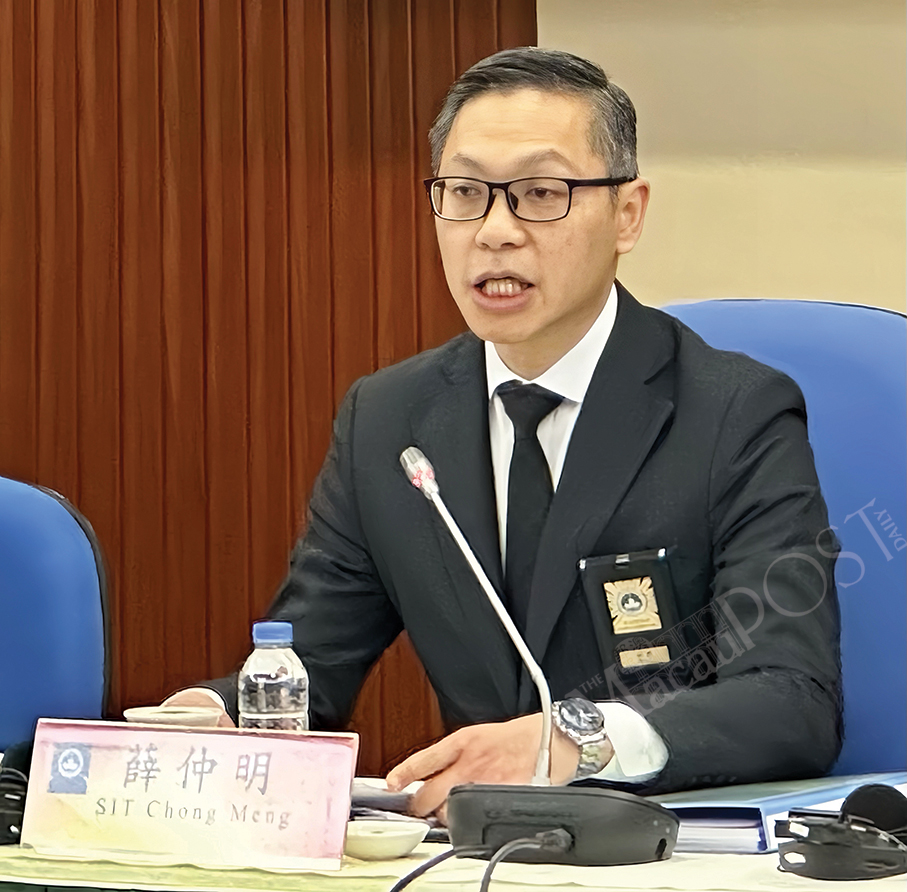The number of telecom fraud cases dropped from 407 in 2023 to 354 last year, with a total loss of more than 150 million patacas, but the proportion of students among the victims rose slightly to nearly 30 percent, with the amount involved reaching 68.1 million patacas, an increase of 54 percent year on year, according to the Judiciary Police (PJ).
Judiciary Police (PJ) Director Sit Chong Meng briefed the media yesterday on their summary of reported crime cases last year, which showed that the overall number of investigations increased by 13.4 percent to 14,049, 7,762 of which involved special investigations. Last year, 3,323 suspects were transferred to the judicial organs for follow-up investigations, a year-on-year growth of 32.1 percent, and Filipinos remained the main segment of foreign suspects handed over to the Public Prosecutions Office (MP), followed by Vietnamese and Indonesians.
Robbery, burglary & gaming-related crimes rise
Sit reaffirmed that very few serious violent crime cases such as homicide – one case only – and grievous bodily harm – three cases only – were reported in the whole of last year, with the number of cases involving triad organisations, criminal gangs, domestic violence, arson, and blackmail decreasing year on year to, respectively, just 1, 25, 12, 43 and 169 cases. However, he added, the number of cases such as robbery, burglary and gaming-related crimes increased as a result of the growing number of visitor arrivals.
Students become fraudsters’ target in ‘fake police’ scams
Last year, the Judiciary Police investigated 354 telecom fraud cases involving 378 victims, 47.3 percent of whom suffered losses of at least 150,000 patacas each. During yesterday’s press briefing, Sit expressed concern that more and more university students in Macau have been falling victim to phone scams, with the total losses rising to 68.1 million patacas last year from 44 million patacas in 2023. He analysed that fraudsters have shifted their tactics by using “fake police” scams targeting mainly students enrolled in Macau, who “are generally affluent and have a higher level of respect and trust in government entities such as the police”. He also quoted examples as saying that some students were even told by the scammers to ask their parents for about 1 to 2 million patacas as a “deposit for supporting them to further their studies abroad for master’s or doctoral degree programmes”.
In 2024, the most common type of cybercrime reported to the Judiciary Police was phishing, with 689 cases resulting in losses of more than 14 million patacas, Sit noted.

Senior Judiciary Police (PJ) officers address yesterday’s press briefing at the PJ headquarters in Zape.

PJ Director Sit Chong Meng briefs the media yesterday about last year’s crime-fighting activities by the Judiciary Police. – Photos: Yuki Lei
High-paying job offers
Concerning five local residents who were lured last year to Cambodia and Taiwan under the guise of high-paying job offers, Sit disclosed more details of the cases yesterday, saying that four of them – one of whom is aged only16 – have meanwhile been detained by the police in Taiwan for collecting fraudulently obtained money from family members of the gang’s victims, adding that only the local resident who had been lured to a “fraud factory” in Cambodia was rescued by the Judiciary Police thanks to the “strong assistance” of the Ministry of Foreign Affairs and the Ministry of Public Security in Beijing. According to Sit, after arriving in Cambodia, the resident was tricked into working for the “fraud factory”, where he was being held against his will, had his passport confiscated and was forced to engage in telecom fraud until he managed to escape from the facility, hide in different areas of the country for a period of time, and finally was able to report the case to the Judiciary Police with the help of friends in Macau and Hong Kong.
Etomidate expected to be controlled this year
The Judiciary Police last year investigated 49 cases of drug trafficking and 15 cases of drug taking, a reduction of one case and an addition of six cases respectively over the previous year, one of which was the largest ever methamphetamine bust made in Macau. Sit said that the Judiciary Police may introduce more advanced drug testing equipment this year, while in terms of controlling the drug etomidate, he added that “we will take forward the legislative work as soon as possible this year, and we believe that the legislation can be successfully enacted this year”. Sit also expressed concern that etomidate is posing a major threat to local students, particularly after the classification of etomidate as a controlled drug in neighbouring cities.
Etomidate is an anaesthetic agent commonly used for the induction of general anaesthesia and sedation. It is already classified as a controlled substance in many jurisdictions.
The local government’s possible bill on the matter would have to be passed by the Legislative Assembly to become law.
11 million patacas seized from illegal currency exchange activities
Regarding gaming-related crimes in Macau, according to Sit, the number of cases handled by the Judiciary Police last year surged by 28.6 percent to 1,423 compared to the same period of 2023. Among them, 84 cases were related to illegal currency exchange activities, involving 120 suspects and 11 million patacas in casino chips and cash seized. The number of cases involving loansharking and related false imprisonment cases stood at 252 and 47 respectively.
Cyberattacks on critical infrastructure
Macau’s critical infrastructure suffered last year 6,300 spikes in cyberattacks, a year-on-year growth of 8.6 percent, mainly due to a number of distributed denial-of-service (DDOS) attacks.
Cyberattack spikes refer to significant increases in the frequency or intensity of cyberattacks over a specific period.
When asked about the police forces’ citywide CCTV cameras, Sit reaffirmed that the installation of the system in various local districts mainly aims to prevent crime with the assurance that the public’s privacy remains protected, underlining that the Judiciary Police are not allowed to use the system for investigative purposes except for suspected criminal cases and some other special cases, such as the search for elderly people suffering from dementia.







